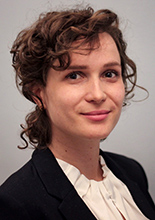DA alumna Brigitte Gerstmann on her career since graduating from ETIA 12 in 2020

DA: Following your ETIA studies at the DA, you are working as an advisor in climate, environment and energy diplomacy at the Foreign Ministry of Austria (BMEIA). What exactly are your responsibilities on the job and how did your career path look like so far?
Brigitte Gerstmann: I currently advise the Austrian Foreign Ministry in diplomatic issues related to the energy transition, climate change and environmental protection. My main responsibilities include drafting briefings and analysis papers, attending policy-related events and conferences and writing speeches. I have also contributed to public diplomacy campaigns of the foreign ministry’s press office. I always aim at incorporating current scientific knowledge in my work. Therefore, one of my main tasks is staying up-to-date. This involves monitoring and analysing the latest publications, reports, events and media coverage. My department also closely coordinates with other relevant ministries, such as the climate ministry, or with the Austrian missions on EU and UN level which makes effective communication a key element of my work.
Before taking up my current role, I worked as a consultant for the IAEA and as a junior researcher for the University of Vienna and the Technical University Graz. In addition to these experiences as well as exchanges abroad, interning at UNIDO and the Austrian Environment Agency amongst others, has helped me to expand my network and find what I am truly passionate about.
Have you always been interested in climate, environment and energy diplomacy, or has this interest developed over time?
I knew early on that my main interest lies at the intersection of natural science and policy. However, it was a gradual process from the chemistry lab in which I analysed environmental pollutants to the representative duties I happen to carry out in my current role. I would still recommend my younger self to set a broad and general career direction, such as the science-policy interface in my case, and then be somewhat flexible and pragmatic in how to get there.
How has the DA helped you with developing your career?
The DA has helped me in many ways. First, it boosted my confidence by providing me with so many opportunities to learn completely new disciplines, socialise with interesting and motivated peers and express myself in various DASI societies and committees. Plus, language courses and career workshops formalised my language and soft skills which was a great benefit to my CV. Finally, I would say that the career talks offered valuable insights into the job market and the many events at the DA provided unique opportunities to network.
Is there a specific skill set taught at the DA that is particularly useful for your current job?
Skill-wise I consider interdisciplinary thinking key to understanding complex and interrelated issues. I also developed solid rhetoric skills at the DA that pay off on a daily basis but especially when it comes to public speaking.
I also need to mention how content-wise my work is almost the exact replication of the two years of the ETIA programme – something I would not have expected from a foreign ministry a couple of years ago. In general, one can’t deny the influence of the green agenda until 2050 on the job market and I highly encourage job seekers to consider this rewarding lane.
Where do you think the future will take you?
I am happy the future will continue to take me down a diplomatic path. I was recently admitted to become a career diplomat and look forward to applying my knowledge and skills in even more aspects of the Austrian foreign service.
[February 2022]